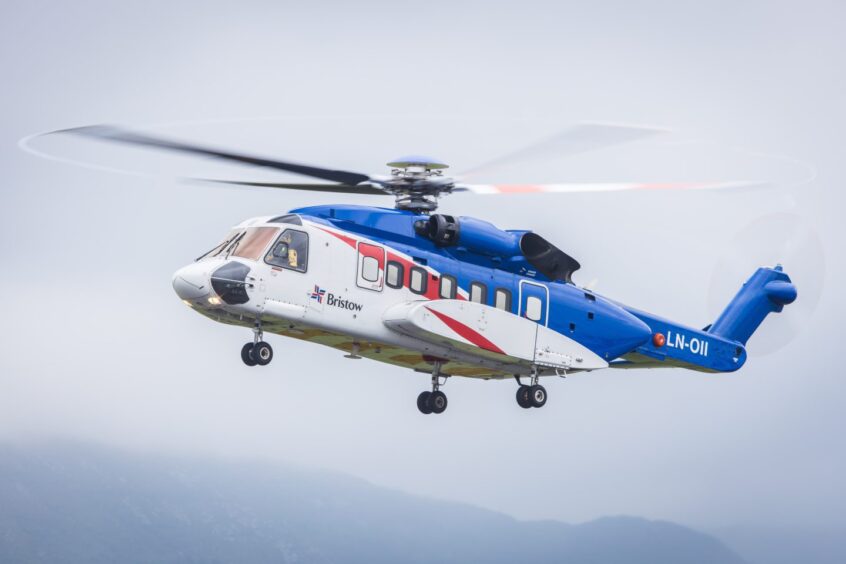
Oil firms Equinor and Aker BP have resumed helicopter flights after a fatal crash off the coast of Norway on Wednesday night.
A woman in her 60s, who was a nurse for the state-backed Equinor, died in the incident involving a Bristow S-92 search and rescue chopper at low-altitude during training flight “associated with vessel/ boat hoisting”.
Helicopter flights were paused by Equinor (OSLO: EQNR) following the incident, but it has since said “there are no indications” that helicopter safety on the wider sector are reduced.
In consultation with the country’s Civil Aviation Authority, Equinor has decided to resume S-92 flights on the Norwegian continental shelf.
It added that unions and safety delegates “are satisfied” with the information received so far.
Similarly, Aker BP has decided to resume flights adding “we see no indications of technical faults common to the helicopter type S-92 or that safety in the transport service has been impaired”.
Georg Vidnes, Aker BP’s director of operations said, based on assessments, it is safe to resume flights with the S-92 from today.
In the UK, a decision was taken yesterday to pause S-92 flights but they have since been widely resumed.
Kjetil Hove, Equinor’s executive vice president for exploration and production Norway, said: “This serious incident affects us all. Flight safety and the safety of everyone travelling by helicopter is fundamental to our operations.
“Based on dialogue with the Civil Aviation Authority, there are no indications that helicopter safety on the NCS is reduced.”
For more information on the details on the incident on Wednesday, go here.
OEUK: ‘Industry is ‘profoundly saddened’
Trade body Offshore Energies UK and Step Change in Safety released a joint statement offering condolences and highlighting that the industry continues to have “confidence” in the safety of the S-92 helicopter and its airworthiness.
They said: “The industry is profoundly saddened to hear of the fatality and injuries of passengers and crew following a helicopter incident during a search and rescue training assignment in the Norwegian sector. Our thoughts are first and foremost with all who were on this flight, their families and those involved in rescue and response.
“When tragic incidents such as this occur, it is a very challenging time for people working offshore and the industry as always is committed to ensuring every effort is made to ensure flights taken by its workforce are as safe as possible.
“The S-92 helicopter has been in operation 20 years and is operated in 28 countries. There are currently 263 helicopters in service flying 2.2 million flight hours that equates to 13,200 hours per month. These helicopters are used in offshore crew change and Search & Rescue (SAR).
“At this time, neither the manufacturer nor the Norwegian Civil Aviation Authority have identified any technical concerns on this helicopter. The industry has confidence in the safety of this helicopter and its airworthiness.
“The industry continues to work closely with a wide range of stakeholders in UK and Norway, including helicopter operators, oil and gas operators and contractors, offshore trade unions, the pilots’ union BALPA, the regulators; HSE and the Civil Aviation Authority and trade associations, to ensure that any learning from this tragic incident is shared across the industry and that appropriate steps are taken.”
‘Highest priority’
Equinor said it has taken time to take care of relatives, make reviews and make clarifications with the authorities and flight safety specialists.
The Norwegian Safety Investigation Authority arrived in Bergen on Thursday morning to start their investigations.
On Thursday, the Norwegian Civil Aviation Authority said it would “continuously assess” the situation and whether the S-92 helicopter type should be grounded.
It added that the case has the “highest priority”.
“We have a dialogue with the manufacturer and the Accident Investigation Board.
“In addition to the Norwegian Civil Aviation Authority, the helicopter manufacturer and the American and European aviation authorities (FAA and EASA) also have the opportunity to suspend the operation of the helicopter type.”
Equinor said the decision has been made to resume in coordination with authorities.
Baste Daltveit, coordinating head safety delegate for Equinor on the NCS said: “The unions and safety delegates are satisfied with the information we have received during the process. We thought it was right that flights were paused after the accident.
“When the authorities and other professional communities say that it is safe to start ordinary transport services, we must have great confidence in them and the decisions that have been made.”
Helicopter variety in Norway
Unions have been calling for a “Plan B” on offshore helicopter safety given Norway’s reliance on the S-92 helicopter.
Earlier today, Equinor announced contracts, which were agreed prior to the incident on Wednesday, which will bring in 15 new helicopters made of Bell 525s and five AW189s.
Recommended for you

